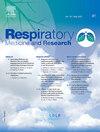French translation and linguistic validation of four questionnaires relevant to psychological interventions targeting persistent dyspnea: The Breathlessness catastrophizing questionnaire, the breathlessness beliefs questionnaire, the COPD self-efficacy scale, and the three-domain interoceptive sensations questionnaire.
IF 1.8
4区 医学
Q3 RESPIRATORY SYSTEM
引用次数: 0
Abstract
Background
Psychological interventions such as medical hypnosis, cognitive-behavioral therapy (CBT), and mindfulness-based techniques are emerging as promising tools in the management of persistent dyspnea. Their integration into clinical practice, however, is limited by the scarcity of validated outcome measures in non-English languages.
Objectives
This study aimed to provide linguistically validated French versions of four questionnaires selected for their potential relevance in assessing the psychological and perceptual dimensions of dyspnea: the Breathlessness Catastrophizing Questionnaire (BCQ), the Breathlessness Beliefs Questionnaire (BBQ), the COPD Self-Efficacy Scale (CSES), and the Three-Domain Interoceptive Sensations Questionnaire (THISQ).
Methods
Questionnaire selection was based on constructs likely to be modulated by psychological interventions: catastrophic thinking, maladaptive beliefs, self-efficacy, and interoception. Translation and linguistic validation followed internationally accepted forward–backward methodology, in collaboration with a specialized agency. Reconciliation was performed through iterative review by subject-matter experts until full consensus was achieved.
Results
French versions of all four questionnaires were successfully produced. Specific challenges arose regarding the translation of key constructs (e.g., “catastrophizing,” “belief,” “self-efficacy”), leading to the proposal of dual titling strategies to balance semantic precision and user acceptability.
Conclusion
These French-language instruments address a practical need for culturally and linguistically appropriate tools in the assessment of psychological dimensions of dyspnea. While developed with medical hypnosis in mind, they may prove equally valuable in research and clinical practice involving other psychological interventions. Psychometric validation in French-speaking populations is warranted.
针对持续性呼吸困难的心理干预相关问卷:呼吸困难灾难化问卷、呼吸困难信念问卷、COPD自我效能量表和三域内感受问卷的法语翻译和语言验证。
心理干预,如医学催眠、认知行为疗法(CBT)和基于正念的技术正在成为治疗持续性呼吸困难的有前途的工具。然而,它们与临床实践的结合受到非英语语言验证结果测量的缺乏的限制。目的本研究旨在提供法语版本的问卷,以评估呼吸困难的心理和知觉维度:呼吸困难灾难问卷(BCQ),呼吸困难信念问卷(BBQ), COPD自我效能量表(CSES)和三域内感受问卷(THISQ)。方法问卷选择基于可能被心理干预调节的构念:灾难性思维、适应不良信念、自我效能感和内感受。在一个专门机构的合作下,翻译和语言验证遵循国际上接受的前向后方法。协调是通过主题专家的反复审查进行的,直到达成完全的共识。结果四份问卷的法文版本均制作成功。在翻译关键构念(如“灾难化”、“信念”、“自我效能”)方面出现了具体的挑战,导致提出了双重标题策略,以平衡语义精度和用户可接受性。结论这些法语仪器在评估呼吸困难的心理维度时满足了文化和语言上适当的工具的实际需要。虽然是在医学催眠的基础上发展起来的,但在涉及其他心理干预的研究和临床实践中,它们可能被证明同样有价值。在法语人群中进行心理测量验证是必要的。
本文章由计算机程序翻译,如有差异,请以英文原文为准。
求助全文
约1分钟内获得全文
求助全文
来源期刊

Respiratory Medicine and Research
RESPIRATORY SYSTEM-
CiteScore
2.70
自引率
0.00%
发文量
82
审稿时长
50 days
 求助内容:
求助内容: 应助结果提醒方式:
应助结果提醒方式:


